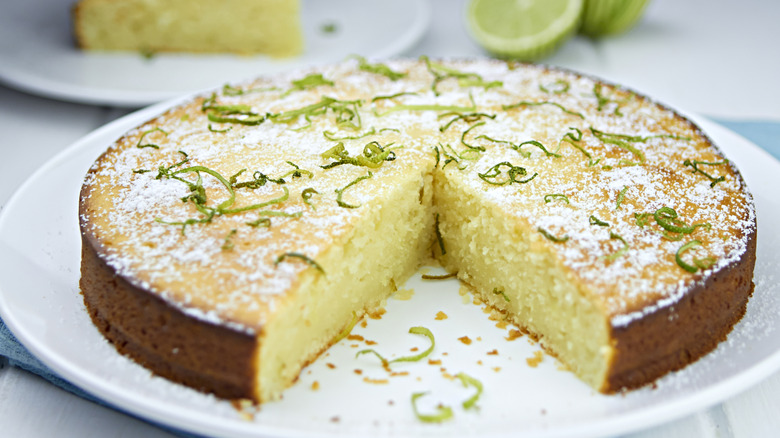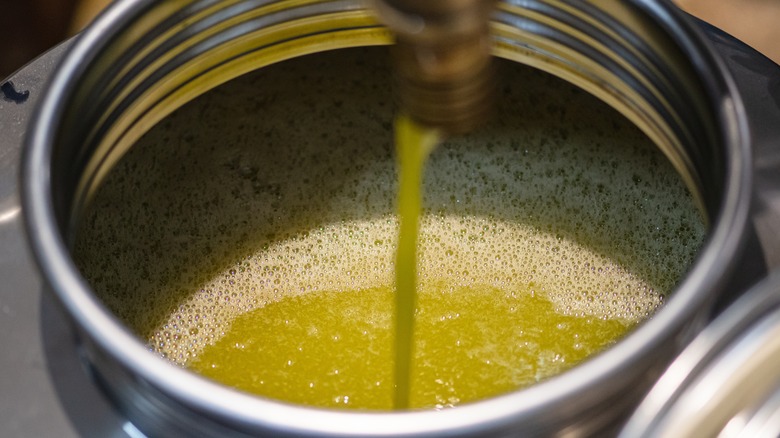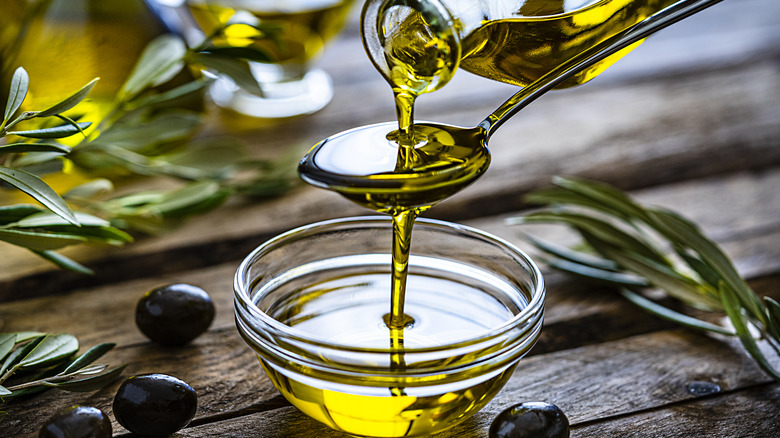The Science Behind Why Fancy Olive Oil Tastes So Delicious In Cake
When it comes time to bake a cake, most of us automatically reach for a stick of unsalted butter. But that's not the only fat in your kitchen that's cake-worthy. Olive oil has been used in pastries in Mediterranean cultures for centuries, and olive oil cake is having a bit of a moment on trendy menus and at buzzy bakeries. Well-made, fancy olive oil has a strong, grassy flavor that makes salad dressing taste amazing, and thanks to a little baking science, it also tastes great with flour and sugar.
Olive oil cakes are made with relatively simple recipes, and any time a recipe only has a few ingredients, you should always pay special attention to the quality of the components. Not only that, the words "olive" and "oil" are right there in the name, which is a major indicator that it is the most important part of the recipe, so don't pinch your pennies on cheap oil when you're making an olive oil cake. Make sure you get good-quality, cold-pressed oil because the better the oil, the more fragrant and delicious your cake will turn out.
Cold pressed olive oil is best
If you've ever dipped a piece of bread in a dish of olive oil, you know there's a big difference between the cheap blends and the good stuff. Extra virgin olive oil that's been cold pressed hasn't been exposed to heat or chemicals while being made, so it retains its natural olive-flavored aromatics. They're also considered "eating" oils because they're best served at room temperature, like in salad dressing or with bread, so their volatile aromas aren't destroyed by heat.
Cheaper olive oils and blends are good for cooking with high heat because they are produced with more pressure and heat than extra virgin oils, don't have a strong flavor, and have a higher smoke point. You might think inexpensive oil is the way to go with an olive oil cake because the flavor is mild and heat will wreck the aromas of expensive oil, but it's actually the opposite. Olive oil will only start to lose its aromas when it reaches its smoke point, which is around 390 degrees Fahrenheit, according to the North American Olive Oil Association, so you don't want to waste money on anything expensive if the goal is grilling or sautéing. A cake, however, never gets much higher than 200 degrees Fahrenheit, so your olive oil investment is safe. Not only that, but the baking process will also bring out the natural fruity, herbal flavors of the oil.
Olive oil pairs well with citrus
Most people who like olive oil cake already like the bold taste of expensive olive oil. There are those naysayers out there, however, who don't care for the strong flavor of olive oil and might not be tempted by a slice of homemade olive oil cake. They shouldn't worry, however, because baking good olive oil into a cake with sugar and flour will mute and mellow the hard edges of the oil's flavors.
If you're worried about your cake tasting too much like salad dressing, however, you can add some citrus to balance out the flavor. Lemon is the most classic pairing, but orange, lime, and even grapefruit are all great flavors with olive oil cake, and you only need a little to give your cake a more complex flavor.
So don't be afraid to go for the big guns when you're shopping for ingredients for an olive oil cake. Since you don't have to worry about high heat, you don't have to worry about losing any of the oil's natural aromas. Spend a few extra dollars on the main ingredient, and you'll be rewarded with a fruity, aromatic cake that's perfect with a big scoop of gelato.


